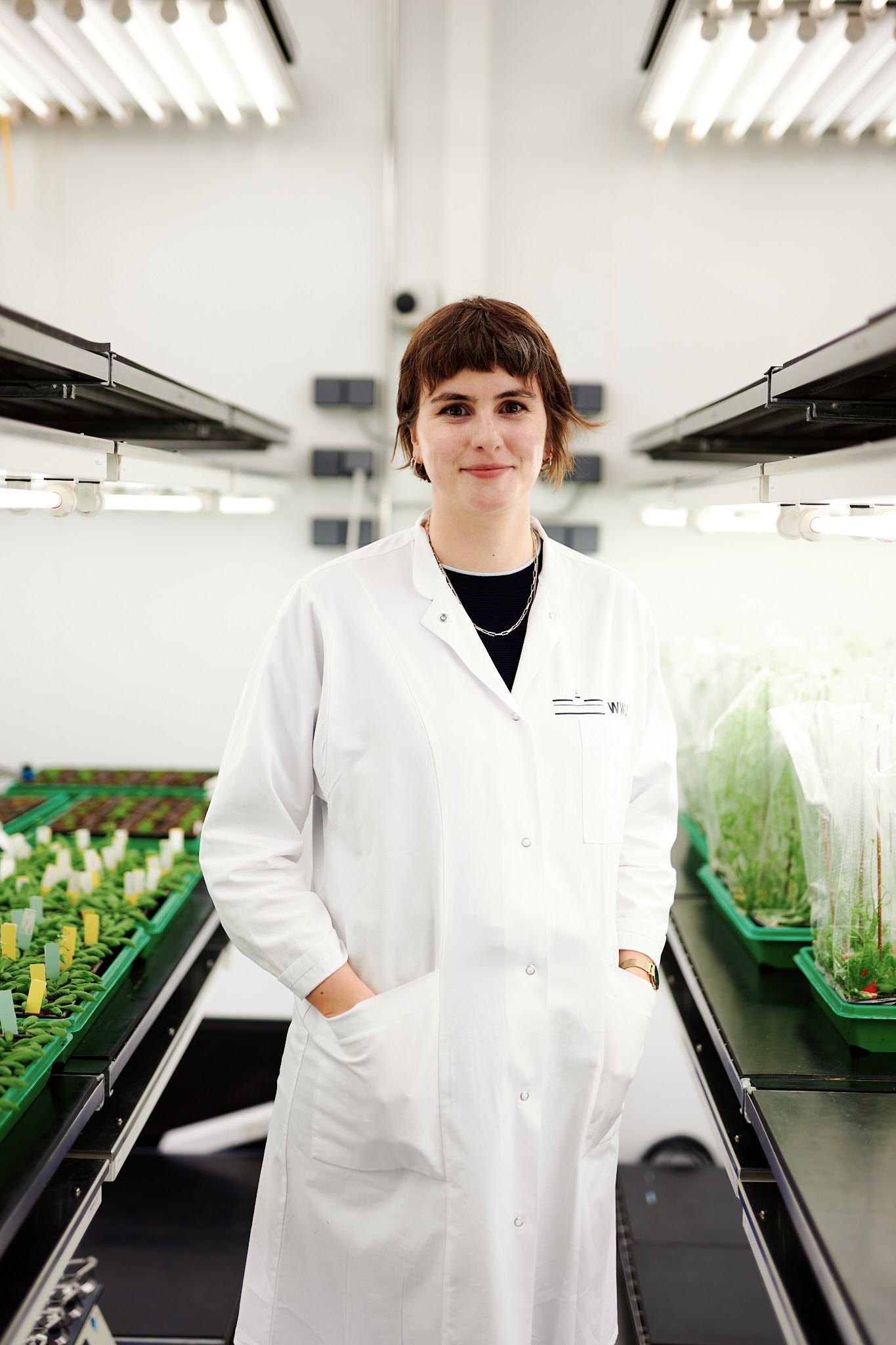
Plant Cells, Big Questions and Bright Minds: A Conversation with Dr Joanna Chustecki
In the series “33 questions” we introduce, in no particular order, our WiRe Fellows who are currently working on a research project here at the University of Münster. Why 33? Well, if we think of the rush hour of life, it is kind of the age that lies in the middle. And we also like the number😉.
In today’s episode, we are speaking with Dr Joanna Chustecki, a computational plant biologist with a deep fascination for the intricate workings and hidden communities inside plant cells. From mitochondria to microscopic networks, her research explores the unseen complexities of of plant biology. A resilient and curious researcher, Joanna´s WiRe-fellowship allows her to tackle fundamental questions about plant development whilst sharing her passion for science with the next generation.
1. What motivated you to work in the field of plant biology ?
A very happy accident. During my undergraduate I really wanted to do a research project in the lab, rather than a literature-based project. I found an opening with my tutor at the time, Prof. George Bassel, who was using computational tools such as 3D models to investigate big questions in plant development. I learnt that we can harness these tools to ask questions that are difficult, if not impossible to ask at the bench. I learnt about the fascinating lives of plants, and I’ve been hooked since.
2. Describe your work in three words.
Mitochondria, microscopes and models.
3. Describe your research topic in three words.
Imaging, networks, DNA.
4. A good plant biologist needs… ?
To be organized, curious and have a steady hand for tricky tasks.
5. What does a typical (work) day look like for you?
As a researcher your days can really vary, but recently I have spent a lot of time writing, whether that’s papers, proposals or talk preparations. However, I am always guided back to the microscope by the questions that drive me and keep me awake. When I have experiments running, my day will be portioned between the lab bench and running code on my computer, with a few pit-stops at the coffee machine!
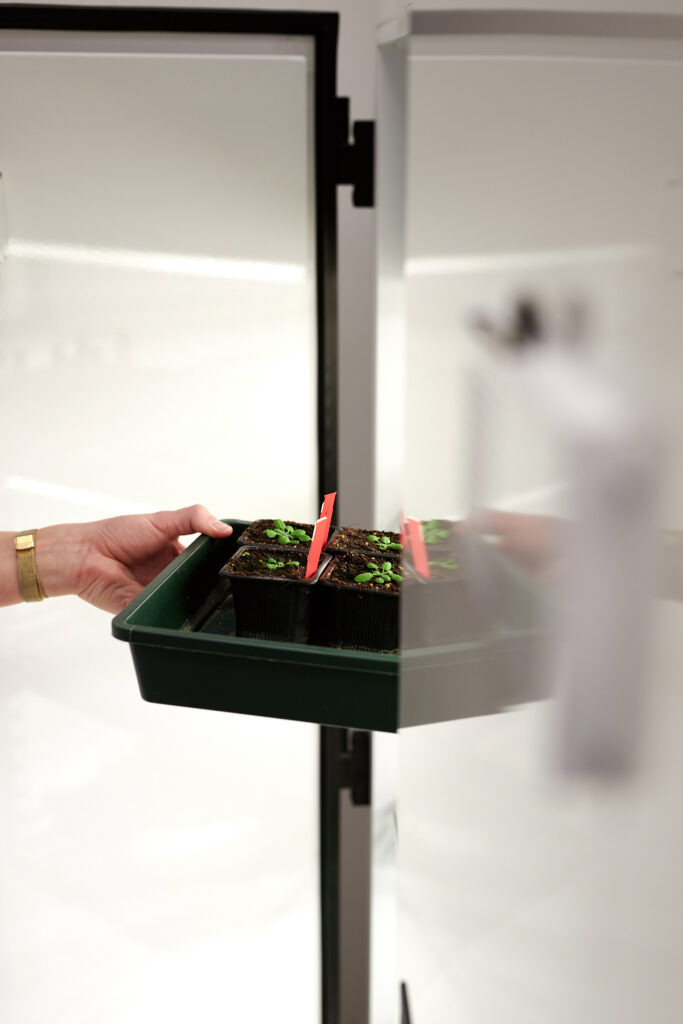
6. What is the best experience you have had as a scientist/researcher ?
I think one of the best has been showing undergraduate lab assistants a new plant line under the microscope for the first time. We introduce fluorescent markers to our plants to help us mark certain proteins or molecules in the cell. These are the moments when you can confidently say, no-one else has seen this exact system before and seeing it down the lens with your own eyes is, for me, a very exciting moment. It reminds you that you’re where you hope to be as a researcher, at the edge of current knowledge. Sharing that with students is hopefully inspiring to them too.
7. What surprised you most about the University of Münster?
I shouldn’t really be surprised by this, being a WiRE fellow, but it’s how actively the University is seeking to broaden itself internationally. I think the support for international students and researchers is excellent.
8. What keeps you motivated in your work day in and day out?
The questions. Why do these tiny mitochondria move about the cell in the way that they do? Why is the behavior we see in plants so different to that in other organisms? And how do key characteristics of these powerhouses differ even within the same cell?
9. Which (historical) important scientist / researcher would you like to have dinner with? What would you ask?
I would love to have dinner with Lynn Margulis. She was a pioneer of the theory of endosymbiosis, that mitochondria and chloroplasts are descended from free-living bacteria and cyanobacteria respectively. She was written off time and time again for this theory, before it was experimentally demonstrated. I would ask her about her resilience and how she kept pushing forward, despite being opposed by the scientific ‘establishment’.
10. If time and money were no object: Which research project would you like to do?
If they were no object, I’d love to really dig into one of the big questions in my sub-field: what are the proteins that regulate the joining and fusing of mitochondria in plants? Do the two membranes of the organelle need different proteins to regulate their fusion? It would take time, and patience around may potential dead-ends, but I believe the outcome would be incredibly valuable to our understanding of how these organelles organize and regulate themselves
11. What is your favorite research discipline other than your own?
During my PhD I was really interested in collective behavior of animals, such as how fish move in shoals and how ants find the optimal route between food source and their nest. Researchers have taken inspiration from these biologically inspired algorithms to solve human-centric problems, like how to optimally route food delivery vans, for example.
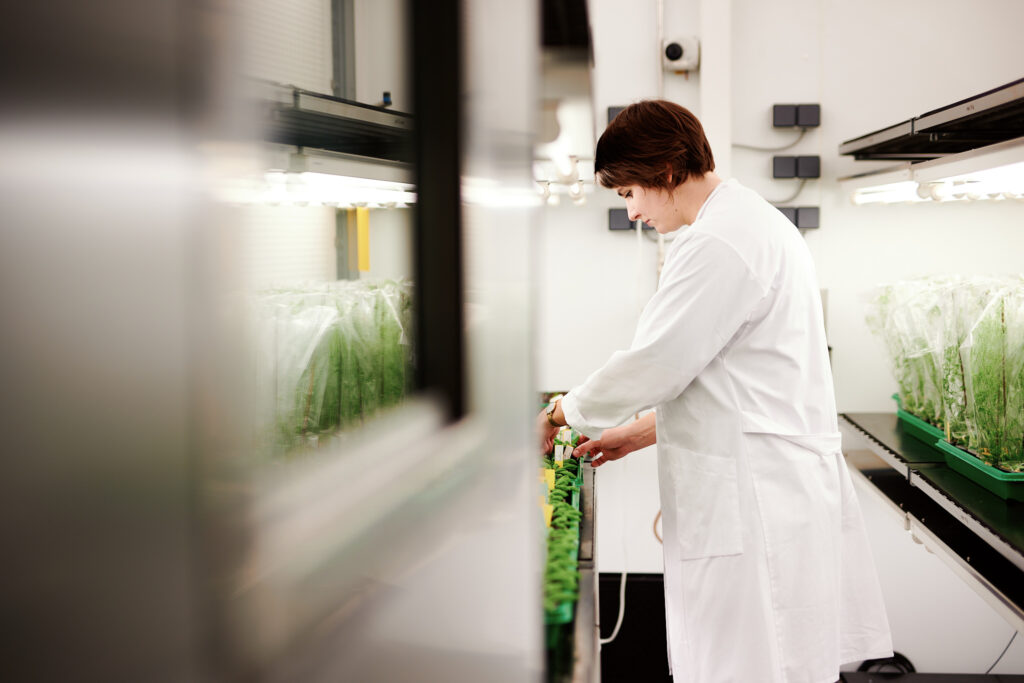
12. What makes you most happy about the world?
The countryside where I grew up, the peace and the changes of weather and cold frosty mornings. I have always loved it but being away from it has made me miss it even more.
13. Which of your traits bothers you the most in your daily work?
Self-criticism. It becomes a hinderance very quickly, rather than a motivator.
14. And which of your traits help(s) you the most in your daily work?
Resilience. It’s a character trait that is essential in any field, but I find it talked a lot about in the academic world. We need to constantly apply for funding and the jobs we do, so being resilient is key
15. How did you survive your PhD time?
Support and encouragement from my partner, my family and my mentors.
16. What advice and tips do you have for future PhD students?
Find supportive and honest people. Whether it’s the relationship with your advisor, the people on your team or further afield.
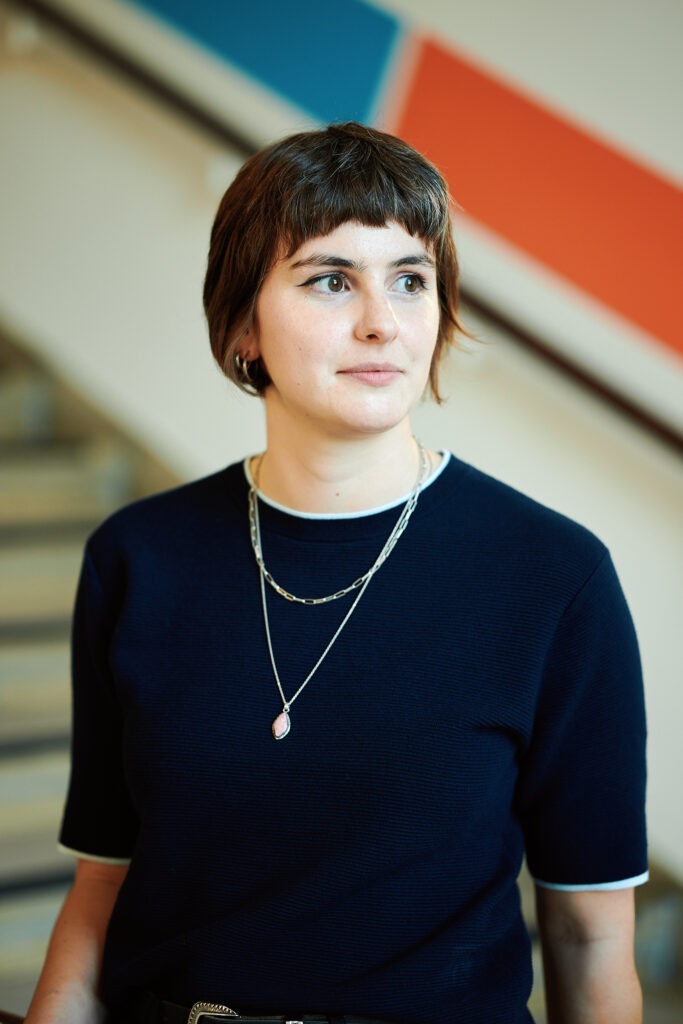
17. How did you imagine the life of a scientist / researcher when you were a high school student?
I thought of scientists as very focused, serious people with pretty much 100% of their time dedicated directly to their research.
18. Is it actually different? In what way?
Scientists are humans- we like to laugh, and be social, just like everyone else. Also, that there are many more matters that scientists must focus on, such as applying for funding, teaching, networking, and outreach. These even must be considered by PhD and masters students. I hadn’t really considered the art of the ‘soft’ side of science before.
19. What do you like most about the “lifestyle” of a scientist / researcher? And what least of it?
The double-edged sword of flexibility! It has been so amazing to travel and see how other countries and labs ‘do’ science, and scientists should be encouraged to travel and gain new experiences, while expanding their networks. However, it can be the case that projects need time, need stability and need years of dedicated and focused work to produce results that stand the test of time. This is not often available to scientists at this early career phase. It can also be so tricky for those who have children, and I am in awe of my WiRE colleagues who are balancing raising a family and world-class scientific output.
19. What direct or indirect relevance does your research have for society ?
My research is currently very focused on fundamental questions in plant science, particularly cell biology. However, the broader goal is that by understanding the roles plant mitochondria play in development, genetics, and metabolism we can aim to manipulate their behavior to develop more bioenergetically efficient crop plants down the line.
20. Do you think your career would have evolved differently if you were a man?
I do wonder about this, and I would like to say no. Everyone has a different path, and I’m sure mine may have played out differently if I were a man. I’d like to say that schemes like WiRE are incredible for so many reasons, and I’m grateful to be able to benefit from it. However, I do see the challenges and burdens faced by my female colleagues at more advanced positions. Across all fields and institutions, a study from the US found that women are more likely to leave academia than men, particularly at later career stages, and most often due to workplace climate (Spoon et al., Science Advance, 2023). So perhaps I will dwell on this question again in 20 years.
21. Where do you see yourself in 10 years?
I hope to see myself with a small team of experimental and computational researchers, delving into some tricky plant cell biology questions. It would be awesome to look back and see whether everything worked out, and if I really do get to pursue my dream projects.
22. If you were the research minister of Germany, what would you do to improve the situation of women in science?
I would hope to be able to support more schemes like WiRE, at universities across Germany, to help attract and retain women researchers from all over the world and give even more of them the opportunity!
23.What is your favorite German word? Why?
This is very silly, but Germknödel. It’s a German/Austrian dessert that you serve with vanilla custard, that I tried when I was little with my family. I just love the way it sounds!
24. How would you explain your research area and topic to a child ?
I would explain that every living thing is made up of tiny little blobs, compartments called cells. Even blades of grass or big strong trees. Even humans are made up of tiny little cells. The inside of every cell is like a factory, with little machines that make energy for us to grow, run around and use our brains. These factories have specific workers, each given a job that helps the factory run. One might be in charge of deliveries, one for running the machines, and another that overlooks the whole cell. My favorite worker in the factory is the mitochondria, who turns food into energy. Plant cells have these workers to, and they work with chloroplasts to turn sunlight into sugar, and the sugar into energy!
25. What is the biggest challenge for you when it comes to balancing family and career?
Location. My specific research field is not a big one, and the key teams are spread across the world. This means I’ve needed to travel a lot, and it puts a strain on all of your relationships.
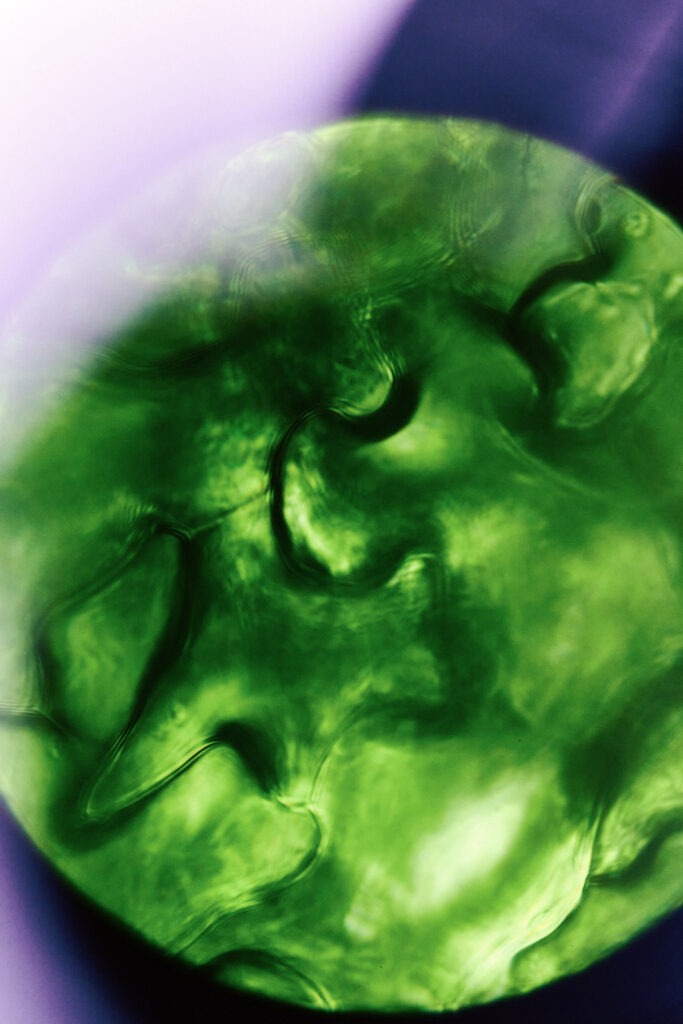
26. How do you master this / these challenge(s)?
I am so lucky to have the most supportive partner and family. The balance is and will continue to be difficult to manage. I am constantly seeking out role models in this, especially from women scientists who do make a successful career while sustain their relationships and raising a family. I have to say, schemes like the WiRE fellowship are so important, to support women scientists at this most crucial time and I wish they were offered in more Universities.
27. What or who inspired you to become a computational plant scientist?
I was always a very curious person, and my parents taught me the names of local plants and herbs we could find near our house. It wasn’t however until I got to University that I realized research could be a viable career in its own right. My mentor and PhD supervisor Iain Johnston was fundamental in that, as well as the amazing mentors I’ve had at Birmingham, Nebraska and now Münster. They have encouraged me so much, and I have been so inspired by them to pursue this career, and the scientific questions that I have.
28. What worries you most about the world?
Wow, so many things. I worry about the climate emergency, and about worldviews becoming more insular. I think a lot of generations have faced questions about the kind of world their children will inherit, but now the threats seem even more existential. However, I know that there are so many creative, inspiring and driven people still out there working to keep making a bright and stable future and planet.
29. Which hobby have you given up for a life in academia?
I really try and work to not have to give anything up. I love to hike and to read, and I try to carve out times when I can enjoy both. I don’t think it’s impossible to do the work you love and the hobbies you love, especially when one can benefit the other.
30. If you could travel in time: in which epoch and at which discovery or event would you have liked to have been there?
This is one of my favorite questions to ask people too! I would love to be a witness to the life on earth at the late Jurassic/ early Cretaceous period when the species that existed are so different to those we have on the planet today (although there are still some around!). Flowering plants were only just beginning to evolve, there was a very warm climate- and plenty of dinosaurs!
31. What is your favorite way to relax from research ?
In the countryside. Being surrounding by nature, remembering the rhythms of life that exist outside of the laboratory setting, that will continue long after we’re gone. It calms me down, and provides a bit of perspective.
32. If you could change one thing about the academic system in which you have last done research in, what would it be?
It would always be to provide more security in terms of salary, or permanent contracts to academics at this awkward phase between PhD and Professor. The flexibility can be a huge bonus to those who want it, but I wonder about how different things could be if we could offer postdocs more security
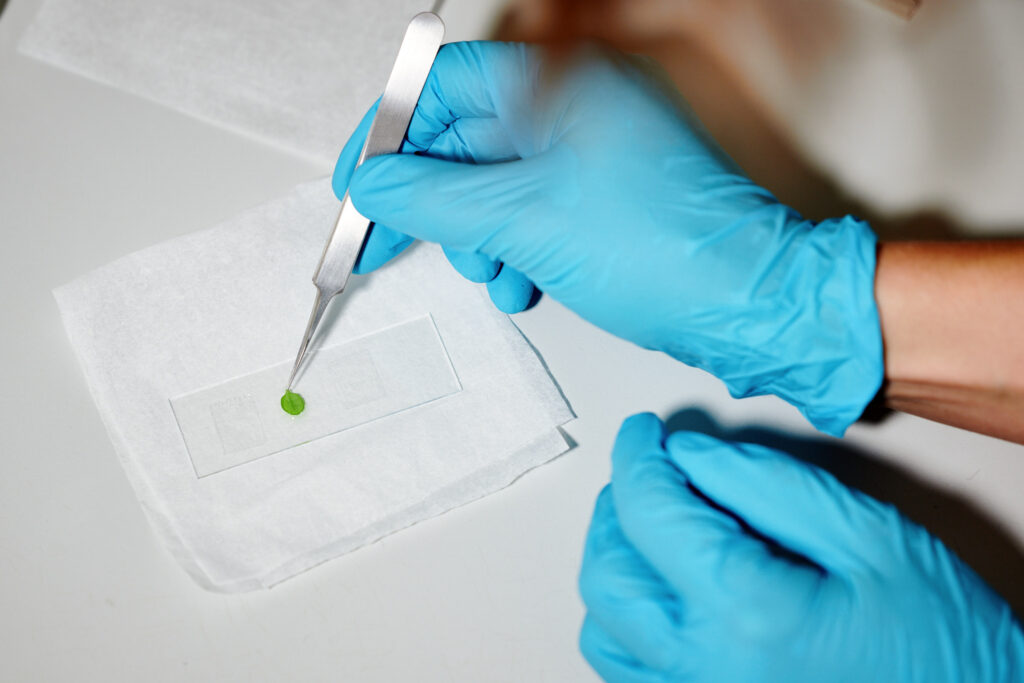
33. What is your favorite place in Münster ?
This is very specific, but currently it’s the bridge at the far side of the Aasee. You get a lovely view across the lake and back towards all the trees and church spires that make up the low skyline of the city.
